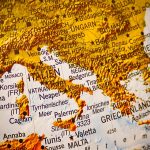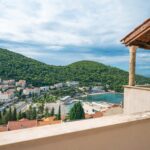ZAGREB, January 2, 2020 – Foreign Minister Gordan Grlić Radman on Wednesday attended a ceremony of the unveiling of a cravat on the facade of the Croatian Embassy in Vienna, symbolically marking the start of Croatia’s presidency of the European Union after which he was at the traditional New Year’s Day concert by the Vienna Philharmonic Orchestra.
“We are marking the start of Croatia’s presidency of the Council of the European Union while the red cravat, some three and a half metres long hanging from the balcony of the Croatian Embassy building in Vienna is symbolic. I think it will be noticed by everyone,” Grlić Radman said.
“The tie (cravat) is recognised as a Croatian brand and in that way, we are attracting the attention of Austrian citizens,” he added.
The unveiling of the cravat preceded this year’s philharmonic concert and it is a great honour and pride for Croatian officials to be invited to this concert, Grlić Radman said who was invited to attend the concert by his Austrian counterpart Alexander Schallenberg.
Austria was one of the first countries to recognise Croatia’s independence and continued to help it in later processes, Grlić Radman recalled.
Twenty-five years ago, Austria joined the EU and “today it is a great friend and we enjoy its support,” he added.
Grlić Radman thanked Schallenberg for his invitation to attend today’s concert on the occasion of marking Croatia’s presidency of the Council of the European Union, saying that this was a “historic moment” for Croatia.
Schallenberg expressed Austria’s support for Croatia in that process.
“Austria supports Croatia’s presidency of the Council of the EU one hundred percent. Croatia is reliable and we know that it will do that job very well,” Schallenberg underscored.
He said he was pleased his Croatian counterpart was in Vienna on the “first day of the New Year and the first day of Croatia’s presidency of the Council of the European Union,” and recalled that the Union is faced with huge tasks from adopting the budget, enlargement and neighbourhood policy and assessed that the EU is in good hands in Croatia.
Referring to bilateral relations between the two countries Schallenberg said that “not only is there a historical connection between the two countries but there is also a close human connection.”
About 80,000 Croatians live in Austria and more than 1.2 million Austrians visit Croatia during their annual holidays, he recalled.
“They are close human ties and we have a very good economic cooperation. Austria is the number one investor in Croatia and with regard to bilateral relations, we can say that they couldn’t be better,” Schallenberg concluded.
Minister Grlić Radman believes that during its presidency Croatia will show “political credibility of its government and all its institutions, officials and in particular the foreign ministry as the coordinator of all activities.”
“We are faced with a huge job and task and we have to do that job in the best way possible in the interest of all EU members, primarily based on regulating relations between the Union and the United Kingdom,” he said.
The multiannual financial framework too is a challenge which “is pretty complex because various approaches exist in member state,” believes Croatia’s minister.
The meeting of the leaders of Eastern European and Western Balkan countries is a challenge because there are differing approaches when it comes to the issue of the Union’s enlargement, he added.
Grlić Radman attended a breakfast held to mark the 25th anniversary of Austria, Sweden and Finland’s accession to the European Union, which was attended by their host, the Austrian minister Schallenberg as well as Sweden’s Prime Minister Kjell Stefan Lofven and Austria’s Chancellor Brigitte Bierlein.
More news about Croatia and the EU can be found in the Politics section.








